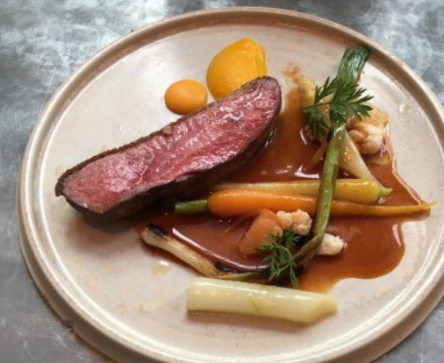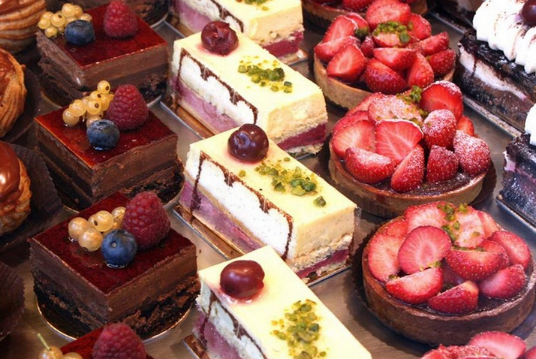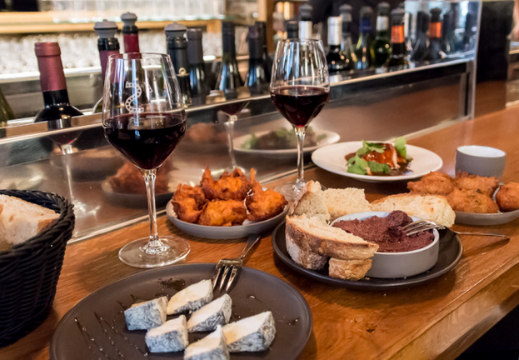It starts with the baguette. Everywhere you go in France you will see someone walking down the street with a baguette. Or two or three. Women and men, young and old, everyone, every day. Purchased from their neighborhood boulangerie (bakery), baguettes come in a little paper sack with about a third of it sticking out for all the world to see.
These are big pieces of bread. And they get a fresh one every day. Why do they need that much bread? It’s great bread, don’t get me wrong. But what are they doing with it? I came to learn that in the morning they eat their baguette with jam or Nutella, and in the afternoon or evening with cheese or pate. Though I did also see children just gnawing on them plain as they walked down the street.
Witnessing the omnipresent baguette was just the first of many observations of food in France. Earlier this month my wife and I spent 12 days visiting France for the first time. French cuisine, like the country itself, is a non-stop deluge of the senses. That is of course one of the main selling points of a vacation in France; you go for the food and wine as much as you go for the Eiffel Tower or the fancy Renaissance castles or the fields of lavender.
The reputation of French cuisine for sublime enjoyment is well-deserved. Everything we ate and drank in France was rich and overwhelmingly delicious. No matter how sophisticated or simple, expensive or modest, each bite of each meal left us in awe.
French food is excellent, it made me delirious, no wonder Joan of Arc had visions.
After eating this way for a few days, the thought dawned on me, as it inevitably must for all first-time visitors to France: how are all these French people not fat? Everything is butter, wine, cheese, flaky pastry with creme, wild boar with garlicky mushrooms and red wine reduction, chocolate-drizzled chocolate. They eat this way every day. Not only are they not fat, the French are quite fit. Yet very few go to the gym. How is this possible?
This is the very definition of the French Paradox.
The term “the French Paradox” was first coined in the 1980’s in a series of medical studies on the French diet. Rates of coronary disease in France were drastically lower than in many other countries with comparable foods like Finland and the US. That was the paradox. For 30 plus years researchers went back and forth trying to find out why. Red wine is good one year, red wine is bad the next. Cow cheese is bad, but sheep cheese is ok, but only if it comes from Alsace. Honestly the clinical data ping-pong is rather tedious and does not tell the real story of the French Paradox.
Armchair philosophers, chefs, and all-around Francophiles also entered the fray to debate the French Paradox. Myths and merits of French eating habits are frequently discussed now as a matter of culture. And after spending two weeks in France, I can tell you the French have very definite opinions about their culture. The way they see it, these aspects of French culture are reasons why French people are not fat:
eating clean: The French have superior access to fresh produce markets, small-scale natural meat and dairy production, home-cooking, almost no processed chemically-treated foods, and strict food production laws.
alternating meal size: If you eat a heavy meal, you make your next meal a light one.
four meals: The French have a mid-afternoon meal called “le goûter”. It is a light snack but still a sit-down meal, not just a donut at your desk. Knowing you will always have this meal means your other meals do not have to be as heavy.
dense flavor experience: French food is so rich and flavorful that you are thoroughly satisfied by a smaller portion (by American standards). This seems to be the most important aspect of the French diet and the prevailing theory.
Sounds so simple, right? The pre-France vacation version of me might have been skeptical. But when I got home from vacation I discovered something amazing. I had lost 4 pounds while in France. Granted, that’s not much for a mammal my size. But I fully expected to have gained 10 or 12 pounds. I did not hold back when I was there. I indulged whole-heartedly in pastries and wine and crepes and charcuterie (French cold cuts) and cheese (sheep cheese from Alsace truly is a transcendent experience). I should have gained weight. I lost weight. I lived the French Paradox first hand.
After some time contemplating the French Paradox, I have decided the possible answers to the mystery are not even all that important. What is more interesting to me is our reaction to the French Paradox. Because it’s only a paradox if we continue to insist it’s counter-intuitive. We assume a disconnect, we assume a mystery. But when our non-French assumptions conflict with actual French reality, the true problem is those assumptions. All those skinny French people eating baguettes prove it.
To sum up then, I say:
- keep an open mind, especially about other cultures
- scrutinize and even distrust your assumptions
- get yourself some nice French wine and fancy cheese
And you might just lose 4 pounds too.






David, I enjoyed your post very much. The last line should have included a nice baguette with that cheese. We love the sights and food of France. Your well written post has my senses smelling those wonderful meals while I read it from my desk. Merci.
Wow this sounds amazing i get to eat cheese and bread and drink wine and lose weight?? sign me up. I’m going to france next vacation.
David – I am embarrassed to say that I salivated when reading this beautifully written blog. Viva la baguette!
Thanks all. I’m glad to share these thoughts and sensations about the food in France. It really is so flavorful that you do feel satisfied with smaller portions. That part I truly do believe.
Here I am trying to fix this French Paradox to some aspect of my work! Ah, to work twice as hard but for half the time… I think there’s a connection somewhere between French cuisine and French/European vacation styles!